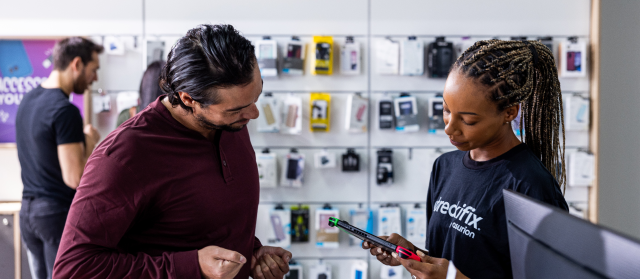It's a scenario that's all too familiar: after a day of productivity, you plug in your laptop to charge overnight. You may think keeping your computer connected to the charger when not in use is smart so it’ll be ready to power up whenever you need it, but are you doing more harm than good? Can overcharging damage your battery or, even worse, pose a safety hazard?
At uBreakiFix® by Asurion, our experts have the know-how to help with all of your tech care needs, from bugs to breaks. In this article, we’ll explore the facts and debunk the myths around laptop charging so you can get the most out of your device’s battery.
Is leaving my laptop plugged in bad?
There is such a thing as overcharging your laptop battery, but it’s not something that happens often with today’s tech. Modern laptops have protective measures built in to ensure that their lithium batteries stop charging once they reach capacity. However, leaving your laptop plugged in all of the time can lead to what’s known as “trickle charge,” which simply means that as long as your laptop is connected to the charger, slow amounts of electricity will be released to it whether it’s fully charged or not. While you will not see the effects of this immediately, if it happens continuously for weeks or months, it can impact your laptop’s battery and decrease its lifespan.

You can’t work when your computer doesn’t want to
Get it repaired fast at one of our stores. Just stop in or make an appointment⎯we'll handle the rest.
Factors that affect battery health
Several factors can impact the health and lifespan of your laptop’s battery.
- Hot & cold temperatures: Extreme temperatures, both hot and cold, can negatively affect your battery’s performance and longevity.
- Heavy usage: Intensive tasks and prolonged use without breaks can put extra strain on your battery.
- Age: All batteries degrade naturally over time, affecting their ability to hold a charge.
Laptop battery care best practices
Adopting good battery care practices can help prolong the life of your laptop's battery:
Optimize power settings
Using power-saving settings can help manage your battery’s workload and efficiency.
Avoid overcharging
Try not to leave your laptop plugged in all the time, especially after it’s fully charged. Not only can it impact your laptop battery’s lifespan, but it can also cause overheating, which comes with its own issues.
Calibrate the battery regularly
Calibrating your battery means letting it run from 100% down to almost 0% occasionally, which can help maintain its accuracy and longevity.
Spot the warning signs
It’s rare for a laptop battery to go kaput without any real signs. It’s more common for your laptop to put out all the warning signals, but they fly under the radar. Knowing what to look for can help you keep a handle on your battery health.
Some of the common warning signs are:
- Overheating
- Battery swelling
- Rapid battery drain
- Long charging times
- Warning messages
- Unexpected shutdowns




